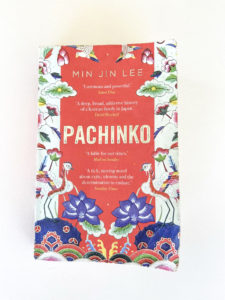For largely pandemic related reasons, this month I seem to have had a lot more time to spend reading. I ended up reading a couple of truly epic and remarkable novels, and family sagas spanning generations seems to have been the genre of the month.
Here is my March Book Review.

Pachinko is a heart-warming, devastating, and sensitive story spanning almost a hundred years, and several generations of a Korean family living in Japan. Min Jin Lee tells the story of the zainichi, a people displaced by circumstance, and discriminated against legally and socially in Japan for decades.
In the novel, the Korean protagonists struggle to find employment or rent properties and are resigned to difficult lives in slum villages on the edge of town, perpetuating the Japanese stereotypes that Korean’s are dirty and unclean. They struggle through war, love, loss and hardship as a family, only for the prosperous future generation to find that the negative stereotypes that held down their ancestors still cling to them in 1980s Japan.
This novel is truly a masterpiece. A long, meandering narrative that takes us from the marriage of a kindly, cleft-lipped boardinghouse master to a sweet young girl in Yeongdo, 1910, to the dissolution of an ambitious young banker’s relationship in Tokyo, 1989, several generations later.
Min Jin Lee has captured the anxieties, joys, fears, the humanity of a generation, a population, a family, and the individuals that make them. The skill and empathy that went into writing this novel is quite incredible. She gave life to a story that the history books forgot.

I have been nagged to read this by my boyfriend almost since the day that I met him until he finally bought me a copy for my Christmas this year. It is his favourite book of all time and after reading it, I do kind of understand why.
Huxley’s prophetic understanding of the world is really quite unnerving. Often compared to Orwell’s 1984, the future that Huxley imagined for us in 1932 is closer to reality today than Orwell’s vision of totalitarian horror.
In Huxley’s novel, there is no ‘Big Brother’, no one dictator of a totalitarian state; rather it is technology that rules the lives of the inhabitants of this ‘brave new world’. In a scary vision of eugenics, the population is biologically sorted into a ‘caste’ system of Alphas, Betas, Gammas, Deltas and Epsilons, each group fulfilling a different role in society from mindless labour to positions of authority running the factories. But the kicker, the key to this whole society, is that each member of society is manipulated in vitro, and conditioned throughout childhood to be happy in their roles. Indeed, we are continually reminded that, ‘everybody is happy now’ in this brave new world.
This world is disrupted temporarily by John the Savage, a character who had grown up in New Mexico in a ‘reservation’ outside the boundaries of society. I have to say, I found it a little disappointing that the ‘savages’ of the reservation lived up to their name quite so neatly. I thought it would have been interesting to see the juxtaposition of this brave new society with one that closer resembled society at the time rather than the tribal, “primitive”, and “savage” example that we were given. Although, I guess some would argue that that is exactly what he did.
In all, this book was gripping, disturbing, and utterly fascinating – it definitely left me thinking a little differently about certain aspects of our society.

So many people have said such good things about this book since it was first published in 2000.
I had read another of Zadie Smith’s books, Swing Time, and whilst I enjoyed it, I wasn’t as blown away by the novel as I had expected to be, so I was a little apprehensive of the high praise given to White Teeth. But I have to say, it could not be more well deserved.
White Teeth is a novel in many parts, with intricacies, and eccentricities, and chapter titles like ‘The Root Canals of Hortense Bowden’. Smith presents an almost circular narrative that hops back and forward in time from inept soldiers in the second world war, to teens struggling with identity in the 21st century, and back to an unsuccessful ancestor who may or may not have sparked the Indian Mutiny of 1857-9.
It is a weaving, winding tale of family and how the imprints of ours ancestor’s actions carry through generations. It is about immigration, separation, connection, history, future, and the unimaginably destructive force that was the British colonial effort.
The detail and nuance of this novel are incredible – it is hard to put into words the impact it had on me as a reader. This is, without a doubt, one to read before you die.
If you are interested in finding out about what else I have been reading this year – check out these articles too!
One thought on “March Book Review”
Comments are closed.

Well written, will read White Teeth